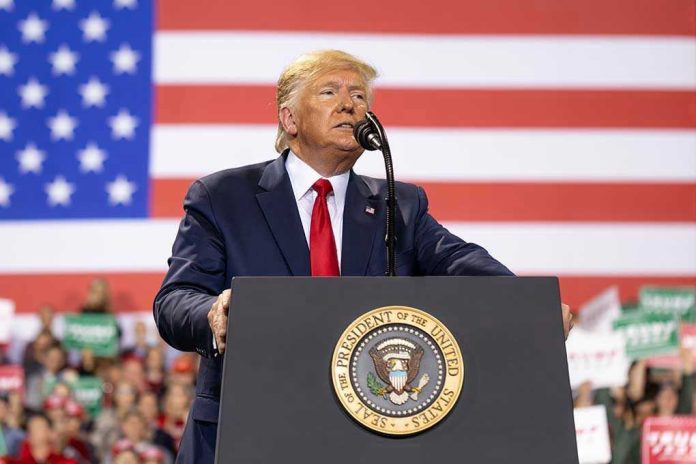
A UFC fighter who once said he’d “take a bullet” for Donald Trump now calls him the Antichrist—a jaw-dropping reversal that exposes the volatile mix of celebrity, politics, and prophecy in America today.
At a Glance
- Bryce Mitchell, a UFC featherweight and once-vocal MAGA supporter, has publicly renounced Donald Trump, citing both political betrayal and biblical prophecy.
- Mitchell’s reversal, posted in a raw Instagram video, accuses Trump of being a “corrupted leader” and links him directly to the “beast” described in Revelation 13:3.
- The fighter’s grievances include Trump’s failure to release Epstein files, support for foreign aid, and economic policies—issues that have also divided the broader MAGA base.
- Mitchell’s journey from MAGA loyalist to religious critic highlights how deeply personal belief systems can collide with political allegiance, even for public figures.
- This episode underscores the growing influence of social media in bypassing traditional gatekeepers, allowing athletes and celebrities to shape political discourse in real time.
The Unfolding Drama
Bryce Mitchell’s transformation from Trump diehard to apostate didn’t happen overnight. In 2019, Mitchell expressed willingness to physically defend Trump during his first term. By December 2024, after Trump’s re-election, Mitchell doubled down, stating he would “take a bullet” for the president. But less than a year later, in October 2025, Mitchell posted a video on Instagram that sent shockwaves through both the UFC and MAGA communities: “I’m not with Donald Trump no more. I don’t support him. I don’t like him. I think he’s a corrupted leader…”
Mitchell’s objections are both political and theological. He cites Trump’s failure to release the Epstein files, ongoing foreign aid to Israel and Ukraine, and economic policies as betrayals of the MAGA promise. More startling, Mitchell invokes Revelation 13:3, suggesting Trump fits the biblical description of the Antichrist: “If you’re a Christian, I want you to get into Revelation 13:3… I do think Donald Trump is that beast of Revelation 13:3.” This isn’t Mitchell’s first foray into religiously charged political commentary—he previously criticized Elon Musk using similar apocalyptic language, indicating a pattern of interpreting current events through a prophetic lens.
The Intersection of Sports, Politics, and Faith
Mitchell’s story is more than a celebrity spat—it’s a case study in how sports, politics, and religion collide in modern America. The UFC has long been a magnet for conservative and libertarian fighters, many of whom openly support Trump. Mitchell’s defection, however, is unique for its religious fervor and public spectacle. Social media platforms like Instagram and X (formerly Twitter) have become the new town square, where athletes bypass traditional media to speak directly to millions, amplifying both their influence and the potential for controversy.
The UFC now faces the delicate task of managing a fighter whose political and religious views have become national news. While the organization has historically tolerated—even celebrated—fighter individuality, Mitchell’s latest statements test the limits of that tolerance. For the MAGA movement, Mitchell’s reversal is a warning sign. High-profile defections, especially those grounded in religious conviction, can erode the loyalty of the base and signal deeper fractures within the coalition.
Broader Implications for American Culture
This episode reveals the fragility of political alliances in the age of social media. Mitchell’s journey from MAGA poster boy to prophetic critic illustrates how quickly loyalties can shift when personal belief and political reality clash. It also raises questions about the role of athletes in political discourse. As more fighters and celebrities use their platforms to weigh in on divisive issues, organizations like the UFC must balance free expression with brand management.
For American conservatives, Mitchell’s story is a reminder that political movements built on personality cults are inherently unstable. When supporters begin to see their leaders through the lens of religious prophecy—for good or ill—the stakes become existential, not just electoral. Mitchell’s case is extreme, but it reflects a broader trend: the fusion of politics and religion, amplified by social media, is reshaping how Americans engage with power, truth, and each other.
What Happens Next?
Mitchell remains an active UFC fighter, but his relationship with the MAGA movement—and possibly with the UFC itself—is forever altered. The fallout from his statements will likely ripple through both the sports and political worlds, prompting debates about the limits of athlete activism and the risks of mixing prophecy with politics. As social media continues to democratize public discourse, expect more stories like Mitchell’s—where faith, fame, and politics collide in unpredictable, headline-grabbing ways.
Sources:
The Daily Beast: UFC Star Who Vowed to ‘Take a Bullet’ for Trump Does Brutal About-Face
BJPenn.com: Bryce Mitchell: Donald Trump is ‘That Beast of Revelation 13:3’
Fox News: Controversial UFC fighter takes back his Trump support in wild rant: ‘I fooled’



